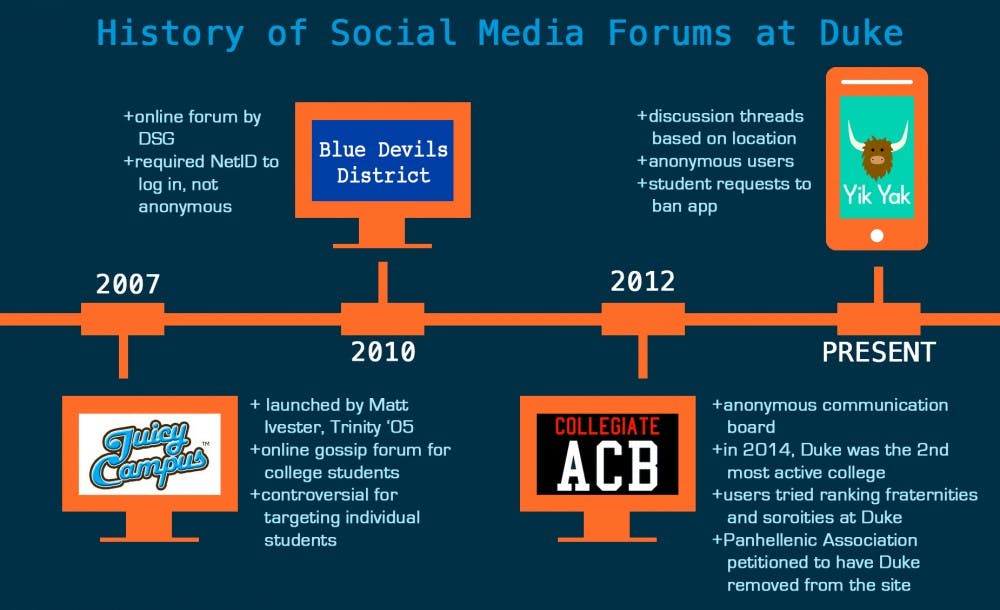Although students have pushed to ban the app Yik Yak from campus, administrators have refused to take action against the forum.
A number of students have expressed concern that Yik Yak has become a conduit for anonymous offensive messages. During the first community forum Nov. 13 to address recent racist and homophobic events on campus, President Richard Brodhead said he did not know if he had the ability to shut down the location-based anonymous forum on campus in response to student requests that he do so. At least half a dozen universities have blocked the app from their campus wireless networks, including Augustana College in Illinois, Saint Louis University, Utica College and Norwich University.
Larry Moneta, vice president for student affairs, ruled out blocking the app at Duke and noted that doing so would not be effective.
“Since it can always be accessed via cell signal, no institution could truly eliminate it from their campus,” he wrote in an email. “For any institution to seek to silence it plays right into [Yik Yak’s] hands...since what they seek is notoriety.”
After several complaints, the College of Idaho asked Yik Yak earlier this month to place a geofence around its campus so that the app would be inaccessible to its students. The app declined the request, according to The Washington Post. The app prevents users who are under 18 from posting by placing geofences around middle and high school campuses but does not geofence college campuses, explained Olivia Borger, Trinity ‘13 and a communications associate for the company.
She noted that the app is working to enhance protective measures.
“Encouraging a positive, constructive, and supportive community environment on Yik Yak is a top area of focus for us!” she wrote in an email. “Today, we have a number of safeguards in place like filters, pop-up warnings, in-app reporting, moderation, and suspensions.”
Yik Yak does cooperate with law enforcement agencies. When issued a warrant, court order, subpoena or in an emergency situation, the app can disclose the user’s IP address, GPS coordinates from where the message was posted, the time and date of the post and other data including phone numbers, according to the Yik Yak website.
Moneta noted that the University only contacts Yik Yak when there is a legal reason to do so.
Yik Yak is not the first form of anonymous communication to appear on college campuses.
Matt Ivester, Trinity ‘05, launched JuicyCampus.com in 2007 as an online gossip forum with pages for colleges across the country. It quickly generated controversy and legal inquiries—including a letter from the Attorney General of Connecticut—for posts targeting individual students.
Ivester shut down the website in 2009 due to the effect of “historically difficult economic times” on its advertising revenues, and wrote that if not for the lost revenue the website would be “thriving,” according to an article in The Chronicle from February 2009.
Duke administrators did not move to restrict the popular forum, but were nonetheless happy to see it shut down.
“Whatever short-term pains it has caused can be replaced by the next foolish look-alike,” Moneta said at the time. “In the long run, it’s meaningless—for each one that comes, one goes. But hopefully it’ll diminish the next.”
Subsequently, two graduate students at Johns Hopkins University and Wesleyan University started CollegiateACB, promising a safer website with features that would ensure internet searches could not find posts discussing individual students.
According to an article in The Chronicle from March 3, 2014, Duke was the second-most active forum on the website, with more than 900 threads and 7,000 comments. The University’s forum experienced a surge in posts after The Chronicle profiled a student adult film actress, in 2014.
Administrators expressed disgust at the content of CollegiateACB, but struggled to find any possible recourse. In 2011, the Panhellenic Association petitioned to have Duke removed from the site, which featured many posts attempting to “rank” sororities and fraternities.
“It has affected our chapters on a collective level,” then-Panhel President Jenny Ngo, Trinity ‘12, said in an April 2011 interview with The Chronicle. “It fuels a social hierarchy that leads to competitiveness between our sororities.”
Duke Student Government tried addressing the problem in 2010 with an online forum called Blue Devils District that required a NetID to log in and was not anonymous.
CollegiateACB’s founder Tim O’Shea sold the site in early 2014 due to the negative media attention and to pursue other ventures. The site can no longer be accessed.
Sue Wasiolek, associate vice president for student affairs and dean of students, encouraged students affected by targeted posts on Yik Yak to seek help.
“Many individuals, including RAs, RCs, and colleagues in DukeReach and CAPS and across Student Affairs, stand prepared to support students who find themselves troubled by posts they read on Yik Yak or on any other social media,” she wrote in an email.
Adam Beyer is a senior public policy major and is The Chronicle's Digital Strategy Team director.

